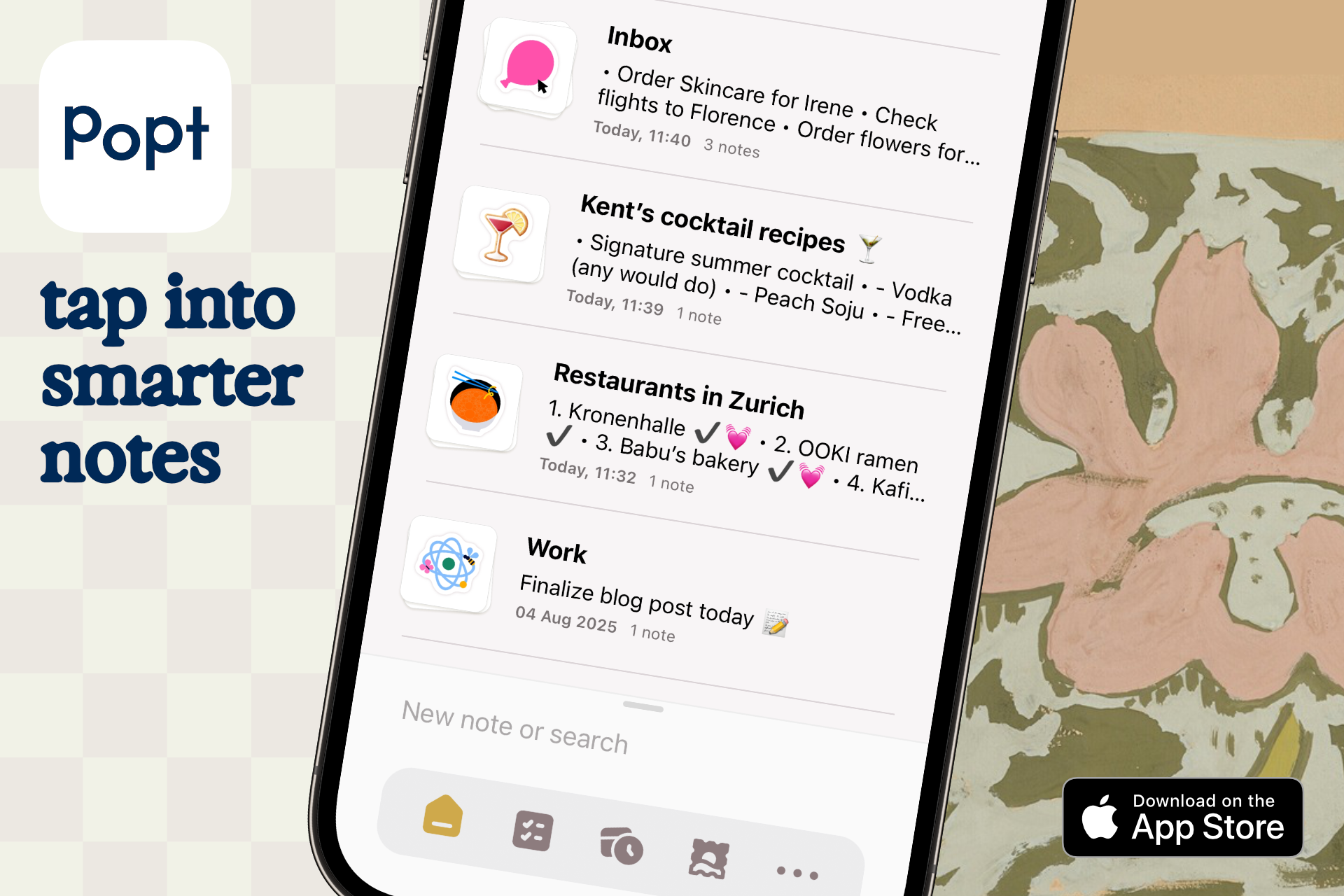Aliveness (what machines can't make) & Mailbox updates its brand and design
Separating the tool from its creator, The Browser company gets acquired by Atlassian, what counts as consciousness, and more in this week's issue of Creativerly.
My name is Philipp and you are reading Creativerly, the internet corner where I unpack my musings, curate and write about noteworthy apps and software, and explore the latest trends in design and tech.
Hey and welcome to Creativerly 342 👋
As someone who works in tech, writes about tech, and spends a lot of time reading and browsing through the bubble of tech, I am increasingly having a hard time with the concept of separating the artist from the art when it comes to the apps, tools, and services I am using. I know, it is an age-old debate, but we now have a modern twin to can we separate the artist from the art, which is the question can we separate the tool from its creator? And as of recently, I get confronted with this question increasingly more often.
I feel like loads of people often overlook the values, ethics, or controversies tied to the creators of the apps, platforms, or services they use on a daily basis. When I get confronted with that, I ask myself if I should boycott a brilliant tool because its founder holds objectionable views, or if the utility of the tool is enough to justify its use. To me, tech is not neutral. Algorithms, design choices, and even the culture of a company seep into the products we rely on. Tech is often a necessity that is embedded in our work, communication, and daily lives, so unlike art, the stakes are higher.
While in some cases (for example with Substack, which I am boycotting to the fullest for multiple reasons) it is easy for me to draw a direct line, and simply search for an ethical alternative (which I have been quite successful with for most of the apps I am using on a daily basis), but at the same time it becomes harder in other places. It is tough to decide whether we should judge a tool by its impact, or by the hands that built it. And additionally, what if we choose to look away? What does that say about us?
What is a tool or platform you have struggled to reconcile with its creator's legacy? Do you also have a hard time to separate the tool from its creator? What tools did you boycott as of recently because of the objectionable views its founder hold?
Rediscover iPhone notes on the go

Popt is a fresh take on mobile note-taking: private, fast, fun, yet packing more smarts than meets the eye. As you type, it quietly suggests tags for dates, contacts and places, never interrupting your flow. With one tap, your words become reminders, contact cards, maps and mentions that make your notes pop to life.
Try it today and help us shape the Popt of your dreams – no sign-up, no ads, and 100% free for early adopters.
This is a paid promotions to support Creativerly. If you are interested in putting your tool, product, or resource in front of over 2000 creative minds, consider advertising in Creativerly and book a sponsor or classified ad spot. Find all the important information at creativerly.com/advertise.
Fresh Updates & News
The Browser Company gets acquired by Atlassian, fully focuses on AI-browser Dia →
Now, this might not be the freshest news and update, as the announcement happened already on September 4, yet I still wanted to include it in this week's issue of Creativerly, and share my thoughts about it. So, The Browser Company, creator of beloved and abandoned Arc browser, and recently shifting its focus fully on Dia, an AI-driven browser, gets acquired by Atlassian ... for $610 million.
First things first, The Browser Company's total funding is $128 million, and they did not make a single cent of revenue. Yet, Atlassian decided that it is worth $610 million, which is fascinating, delusional, and pathetic at the same time. Seeing all those tech bros online celebrating this acquisition as a success is another thing that my mind simply can not process. What my mind also can not process is the fact that they built probably the most beloved browser of the 21st century, and instead of monetizing it in order to keep their lights on, they simply decided to abandon it, and shift their focus to AI, since apparently, if you are observing the field of tech, this is what you are supposed to do in 2025.
The Browser Company will operate independently under Atlassian, according to a post on X by The Browser Company's CEO Josh Miller, as TechCrunch reported. They core focus will be the continuous development of Dia, which is the AI-driven browser the team started working on last year after they decided to stop development of its previous browser, Arc.
When I browse my bubble, I see loads of comments about Dia, and they all pretty much surround the fact that folks have tried it out but abandoned it shortly after since they could not find a single use-case where it would actually make sense to them to switch to a new browser like Dia. So, a past comment from Josh Miller, which he shared in a newsletter update back in May (I am not linking to it, since The Browser Company is using Substack, but if you would like to read it, it is called "Letter to Arc members 2025"), and which goes "Our metrics were more like a highly specialized professional tool (like a video editor) than a mass-market consumer product, which we aspired to be closer to" sounds even more pathetic now, as they have abandoned the beloved browser in order to focus on something no-one has asked for, and according to my bubble, does not introduce valuable features or workflows that would lead to people making the switch to an AI-driven browser.
The tech scene in a nutshell.
Mailbox updates its brand and user interface →
I left Gmail already a while ago. After doing some quick research back then, I moved all my email activity to Proton Mail. There were some ups and downs during the time of my usage (especially since there were some major outages) but overall, the experience was still way better than Gmail, since Proton Mail focused on offering a privacy-first email experience. However, in late 2024 and early 2025, I moved all my email activity from Proton Mail to Mailbox, as Andy Yen, Proton's CEO and co-founder, praised the Republican Party in a post on X, and additionally made some weird comments from the company accounts across Mastodon, X, and Reddit.
Mailbox is a digital workspace, secure, reliable, and accessible. It offers secure and spam-free email inbox, doubly-secured cloud drives, video conferencing, as well as office tools for collaboration. Its data centers are in Germany, where your data is stored securely. It uses consistent data encryption, during storage and transmission, and Mailbox operates its infrastructure sustainably with 100 per cent renewable energy. Lovely.
My migration from Proton Mail to Mailbox went quite smoothly. The only thing I was not that attracted to was their interface, which felt quite outdated. Therefore, I got excited when I read the recent news that Mailbox reimaged it brand, technology, and design. As part of this, the complete Mailbox suite has been redesigned to make daily work more efficient. I have been only using Mailbox for my email activity, so I have not explored the full suite of tools yet, but the overhauled and redesigned email interface is a very welcomed and appreciated change, as it provides more clarity, a cleaner, and more structured interface and experience.
Mental Wealth
❯ The science-backed case for doing nothing: why your brain needs time to drift – “Every day, we’re faced with constant opportunities for stimulation. With 24/7 access to news feeds, emails and social media, many of us find ourselves scrolling endlessly, chasing our next hit of dopamine. But these habits are fuelling our stress – and our brains are begging for a break.”
❯ What counts as consciousness? – “Some years ago, when he was still living in southern California, neuroscientist Christof Koch drank a bottle of Barolo wine while watching The Highlander, and then, at midnight, ran up to the summit of Mount Wilson, the 5,710-foot peak that looms over Los Angeles.”
❯ The Problem of What Others Think – “In a letter from Seneca to his friend Lucilius, he writes: "It’s the height of madness to worry about being despised by the despicable." One of the great causes of suffering is this maddening worry about what others think of us. I can go into its causes by pointing to evolutionary psychology and our hunter-gatherer roots, but that’s neither novel nor interesting. Rather, I want to delve into the asymmetry between what we know about ourselves, and the uncertainty surrounding what others know of us. Because at its core, the worry about what others think is ultimately a function of uncertainty.”
❯ Aliveness (what machines can't make) – “Have you ever held an object and felt the maker's presence in your hands? In art they call it 'aura'. It's what distinguishes an original painting from its reproduction, what you hear in Miles Davis or Nina Simone’s live jazz performances, what you taste in the dishes that ignite happy childhood memories (for me it’s my mother’s take on pasta all'Amatriciana). The work carries something of its creator that no machine can replicate, at least not yet. And even if they could, why would we want them to?”
Do not miss out on this ...
❉ Experience the ultimate vector editor for macOS, iOS, and iPadOS. Get started with Amadine*.
❉ Think tasks, not apps. Setapp* is you one-stop subscription to solving every task on Mac and iPhone.
❉ Fathom is cookie-free, GDPR compliant, privacy-first website analytics software. Get $10 off your first invoice and a 7-day free trial when you use this link*.
These are paid promotions or affiliate links to support Creativerly. If you are interested in putting your tool, product, or resource in front of over 2000 creative minds, consider advertising in Creativerly and book a sponsor or classified ad spot. Find all the important information at creativerly.com/advertise.
Appendix
❯ ICYMI
Tired of complex note-taking apps? Discover Popt, a smart, simple iOS app that auto-tags contacts, places, and dates, making notes fast, fun, and effortless. You should not have to worry about creating a bunch of backlinks, connections, numerous folders in order to get the most out of your note-taking practice. Note-taking should simple, plain, fast, smart, seamless, and fun. And with this post, I am excited to introduce you to a fresh new app that ticks all those boxes. Let us dive into my newest deep dive about Popt.
❯ Quick Bits
- Microsoft avoids EU fine after Slack complained about Teams bundling (Tom Warren / The Verge)
- Albania’s prime minister wants to appoint an AI to his ministry (Simon Sharwood / The Register)
- OpenAI and Microsoft sign preliminary deal to revise partnership terms (Benj Edwards / Ars Technica)
- Social media is the worst place to be right now (Adam Clark Estes / Vox)
- Electricity inflation hits highest level in two years as AI boom rumbles on (Matt Phillips / Sherwood)
- Elon Musk’s Boring Company suspends work on Vegas airport tunnel after ‘crushing injury’ (Sean O'Kane / TechCrunch)
- Gmail gets a dedicated place to track all your purchases (Ryan Whitwam / Ars Technica)
- Google is shutting down Tables, its Airtable rival (Sarah Perez / TechCrunch)
- Pardoned Insurrectionists Are Using Charlie Kirk’s Death to Call for Civil War (Kiera Butler, Julianne McShane / Mother Jones)
- Why your attention keeps slipping away (and how to get it back) (Danny Kenny / Big Think)
- Trump Disbands Climate Contrarian Group Without Retracting Report (Alexander C. Kaufman / Heatmap News)
- The US and China might finally have a TikTok deal (Emma Roth / The Verge)
- As AI Companions Reshape Teen Life, Neurodivergent Youth Deserve a Voice (Noah Weinberger / Tech Policy Press)
- Countries are struggling to meet the rising energy demands of data centers (Daniela Dib, Pablo Jiménez Arandia / Rest of World)
- Liquid Glass Could Be One of Apple's Most Divisive System Designs Yet (Craig Grannell / WIRED)
- OpenAI board chair Bret Taylor says we’re in an AI bubble (but that’s okay) (Anthony Ha / TechCrunch)
- Rolling Stone’s parent company sues Google over AI Overviews (Terrence O'Brien / The Verge)
- Washington Post fires black woman who quoted what Charlie Kirk said about black women (Rob Beschizza / Boing Boing)
- Trump’s War on Wind Continues With Maryland Suit (Alexander C. Kaufman / Heatmap News)
- Women judges see rising threats to their work — and clear paths to defusing them (Candice Norwood / The 19th)
- Trump’s Tariffs Are Hurting Women of Color’s Businesses (Tatiana Walk-Morris / Dame Magazine)
- xAI reportedly lays off 500 workers from data annotation team (Anthony Ha / TechCrunch)
- Elon Musk is trying to silence Microsoft employees who criticize Charlie Kirk (Jay Peters / The Verge)
Till next time! 👋
Support: Do you have a friend who is looking for inspiration, news about design, and useful tools and apps? Forward this newsletter to a friend or simply share this issue and show some support. You can also show some love by simply clicking the button down below and keep this newsletter a sustainable side-project by buying me a coffee. ☕️ 🥰
Some of the links in my newsletter and my blog posts are affiliate links. Those links are marked by an asterisk. If you buy something through the link, the product will not cost you anything more, but I will receive a small commission which not only supports Creativerly and my work but also helps me to keep this publication a sustainable side-project.
Creativerly is proudly published with Ghost*.





Discussion